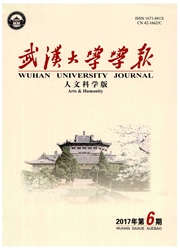

 中文摘要:
中文摘要:
作为一位富有道德诉求的小说家,菲尔丁在《约瑟夫.安德鲁斯的经历》、《弃儿汤姆.琼斯的历史》和《阿米莉亚》三部主要小说中明确提出了"美德有报"的伦理思想,其中蕴涵的道德奖励意味,深刻反映了这一思想所具有的利己主义特征。与注重观念推演的伦理学家不同的是,菲尔丁充分关注利己主义道德行为展开的具体情境:他强调主人公的仁善动机源于自然的感性冲动,并通过助人美德客观效果的讲述,提出了助人才能助己、个人幸福与他人幸福相结合的基本模式。而其中有关强调情感而非物质的现实报偿及荣誉问题的描写,也充分反映了菲尔丁为主人公道德成长寻求价值回馈的叙事意图。
 英文摘要:
英文摘要:
As a novelist with moral aspirations, Henry Fielding proposed explicitly the ethical thought of "virtue deserving reward", which implied the characteristics of rational egoism in his three novels The Adventures of Joseph Andrews, The History of Tom Johns: A Foundling, and Amelia. Compared with the moral philosophers who pay more attention to ethical concepts, Fielding expounded the thought of rational egoism under concrete situations. In his novels, Fielding gave a detailed analysis of emotional impulse embodied in protagonists' benevolence. The protagonists' good deeds and virtues in helping others would, in return, eventually help themselves pull through danger. That is to say, their helps for others essentially help themselves; personal happiness would combine with others' happiness. The narrative mode emphasized on the emotional rather than material rewards, and the related description of the problem of honors also fully reflected Fielding's narrative intent of seeking feedback to the moral growth of protagonists.
 同期刊论文项目
同期刊论文项目
 同项目期刊论文
同项目期刊论文
 期刊信息
期刊信息
